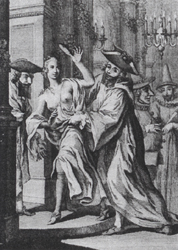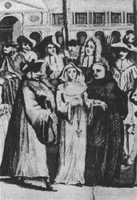My latest erotic novel is a Scottish historical written in collaboration with KyAnn Waters, An Improper Wife. This story opens with our heroine setting out to engage a night of passion the day before she is to enter a loveless marriage. What better place to do that than the eighteenth century masque?
The eighteenth-century masquerade was inextricably linked to an erotic atmosphere. Issues of gender, sexuality and role-reversal were all tangled up within the confines of the ballroom. The activity at masquerades included the touching and fondling of strangers, and propelled a highly sexual energy among guests. The donning of masks brought an inevitable sexual tension prevalent among masquerade-goers. This tension is the subject of much scrutiny. Because the masquerade focused on the disguise of identity, the face was often hidden and the body emphasized. Sexuality took on a whole new freedom at the masquerade ball. For the English masquerade participant, modesty was redefined. One did not need to follow the usual restraints of everyday life. Masks were particularly significant as aphrodisiacs: " conventional wisdom held that someone donning a mask, especially a woman, experienced an abrupt loss of sexual inhibition". Since a mask provided detachment from identity, it provided a sort of detachment from traditional morality, as well.
Prostitutes were common at masquerades, and contributed to the sexually charged atmosphere. Promiscuity among women at masquerades was common, even if the sexual activity was not taking place at the ball, it was certainly exacerbated by the atmosphere and the aura of the masquerade. Women normally had to conform to very strict societal rules regarding sex and sexuality, but at masquerades, some of these rules were stripped away. For example, the masquerade was the only place, other than church, that a woman could go unattended. Thus, some observers argue that the masquerade was a liberating force for women, providing them a sense of freedom they had never experienced before. Furthermore, since women could, under her disguise, act "aggressive, domineering, and controlling", she was able to assume an identity that was definitely more
 traditionally
"male" in nature. This maleness, some say, afforded her a certain amount of
power and liberty. Women could also dress as traditionally powerful female
figures such as Greek goddesses. In the space of the masquerade, women could
carve out identities that they were not supposed to live in their real lives. The woman that did exercise the sexual freedom she experienced
at a masquerade would, of course, have to pay stronger consequences than a
man if something went wrong. Dress certainly contributed
to the sense of sexuality at the ball: "prudish" dress probably heightened
a sense of mystery, while certain overly revealing costumes
(such as Elizabeth Chudleigh's portrayal of Iphigenia) shocked observers and
contributed to an air of sexual explicitness.
traditionally
"male" in nature. This maleness, some say, afforded her a certain amount of
power and liberty. Women could also dress as traditionally powerful female
figures such as Greek goddesses. In the space of the masquerade, women could
carve out identities that they were not supposed to live in their real lives. The woman that did exercise the sexual freedom she experienced
at a masquerade would, of course, have to pay stronger consequences than a
man if something went wrong. Dress certainly contributed
to the sense of sexuality at the ball: "prudish" dress probably heightened
a sense of mystery, while certain overly revealing costumes
(such as Elizabeth Chudleigh's portrayal of Iphigenia) shocked observers and
contributed to an air of sexual explicitness.
Thus, while it can be argued that the masquerade was liberating
for women, some critics suggest that it was actually a step backwards in their
emancipation. Catherine Craft-Fairchild argues that the masquerade actually
did not "alter women's status". The facial mask that
hid the eyes and thus the soul transformed a woman into a mere sexual object. And since the focus of masquerades was the symbiotic
sense of voyeurism and self-display, Craft-Fairchild wonders who did the gazing
in the  eighteenth-century
masquerade. Her answer is found in a play by William Wycherley, where he writes,
"A Woman mask'd is like a cover'd dish, giv[ing] a Man curiosity, and appetite". Craft-Fairchild concludes that when the woman becomes
the spectacle, she does not obtain a higher sense of freedom; rather her status
as a subject for man's pleasure lowers her freedom even more.
eighteenth-century
masquerade. Her answer is found in a play by William Wycherley, where he writes,
"A Woman mask'd is like a cover'd dish, giv[ing] a Man curiosity, and appetite". Craft-Fairchild concludes that when the woman becomes
the spectacle, she does not obtain a higher sense of freedom; rather her status
as a subject for man's pleasure lowers her freedom even more.
 eighteenth-century
masquerade. Her answer is found in a play by William Wycherley, where he writes,
"A Woman mask'd is like a cover'd dish, giv[ing] a Man curiosity, and appetite". Craft-Fairchild concludes that when the woman becomes
the spectacle, she does not obtain a higher sense of freedom; rather her status
as a subject for man's pleasure lowers her freedom even more.
eighteenth-century
masquerade. Her answer is found in a play by William Wycherley, where he writes,
"A Woman mask'd is like a cover'd dish, giv[ing] a Man curiosity, and appetite". Craft-Fairchild concludes that when the woman becomes
the spectacle, she does not obtain a higher sense of freedom; rather her status
as a subject for man's pleasure lowers her freedom even more.
Cross-dressing was a common form of disguise at masquerades. This crossing of gender lines in dress was almost
always a catalyst for sexual symbolism and questioning. Men were able to dress
as women and thus identify themselves in a way that would have otherwise been
taboo; women could do the same. Gender roles could be reversed as easily as
class roles. Closely linked to this topic, the issue of homosexuality was
also one that appeared at masquerades. The masquerade provided an "unusual
opportunity for erotic experimentation and release".
The masculine appropriation of female traits at the masquerade served to contribute
to an aura of traditional sexual inversion and practice.
What do you think, a step backwards or forwards for women?
Betrothal to the callous Lord Blackhall painted a future devoid of love. Upon his death, Lady Caroline Wilmont is promised to the younger brother. Caroline refuses to allow her first taste of desire to be at the hands of a man who would rather have any woman but her. This, her last night of freedom, is to be a memory of lust that she can take with her throughout her loveless marriage. As Aphrodite, Caroline attends a masque determined to find a man to initiate her into the intimacies of erotic love.
Taran Robertson, Viscount of Blackhall, makes no secret that he despises his obligation to marry the Sassenach heiress chosen for him by his father. As a last foray before his wedding, he attends a masque. However, the spirited vixen he meets and seduces has secrets...secrets that just may reveal he’s to have an improper wife.
Taran Robertson, Viscount of Blackhall, makes no secret that he despises his obligation to marry the Sassenach heiress chosen for him by his father. As a last foray before his wedding, he attends a masque. However, the spirited vixen he meets and seduces has secrets...secrets that just may reveal he’s to have an improper wife.
Now available in print and digital at your favorite distributor.
WWW.TARAHSCOTT.COM


No comments:
Post a Comment